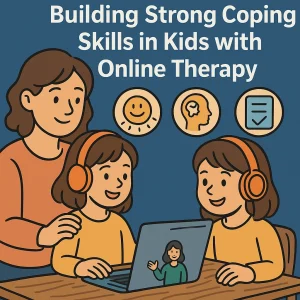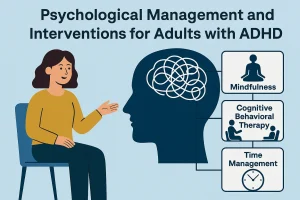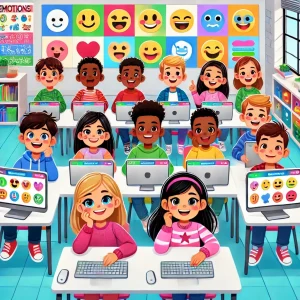How Online Counseling Can Assist Children with Social Anxiety
Last Updated: September 2, 2024
Social Anxiety in children is more common than many people realize. Imagine a child who is terrified of speaking up in class, or who avoids joining in on playground games because they’re too worried about what others might think. This fear can be overwhelming, affecting not just their social life but also their emotional well-being and academic performance. Social anxiety is more than just shyness; it’s a serious condition that can hinder a child’s ability to engage fully with the world around them.
As awareness of mental health grows, so does the recognition of the need for effective solutions to help children manage and overcome social anxiety. One such solution that has been gaining traction is online counseling. With the rise of digital technology, online counseling has become a convenient and accessible option for many families. It offers children a way to receive professional support from the comfort of their own homes, which can be particularly beneficial for those who find face-to-face interactions daunting.
Also Read: How to control Test Anxiety in Children?
Understanding Social Anxiety in Children
Social anxiety is more than just being shy or nervous in social situations; it’s a profound and often debilitating fear of being judged, embarrassed, or humiliated in front of others. For children, this anxiety can manifest in many ways, from avoiding eye contact and speaking softly to outright refusing to participate in group activities. Social anxiety can affect a child’s ability to connect with peers, succeed in school, and enjoy everyday experiences.
1. Impact on Children’s Lives:
Children with social anxiety often struggle silently, as their fears can go unnoticed or be mistaken for mere shyness. This condition can significantly impact various aspects of a child’s life. In school, a child with social anxiety might avoid raising their hand, participating in group projects, or even attending school altogether. Socially, they may have difficulty making friends, joining clubs, or attending parties. These missed opportunities can lead to feelings of isolation, loneliness, and low self-esteem.
2. Common Signs and Symptoms:
Recognizing social anxiety in children is crucial for early intervention. Some common signs include:
- Avoidance of Social Situations: Children may go out of their way to avoid situations where they might have to interact with others, such as school events, birthday parties, or even family gatherings.
- Excessive Worry: They may constantly worry about what others think of them or fear being judged, criticized, or embarrassed.
- Physical Symptoms: Anxiety can cause physical symptoms like stomachaches, headaches, trembling, sweating, or even panic attacks when faced with social situations.
- Difficulty Speaking: Some children may find it hard to speak in front of others, leading to mumbling, speaking very softly, or not speaking at all.
- Clinginess: Younger children might become overly attached to parents or caregivers, fearing to be left alone in social settings.
3. Impact on Development and Daily Life:
The impact of social anxiety on a child’s development can be far-reaching. Socially anxious children often miss out on critical developmental milestones that involve learning to interact with others, manage social relationships, and build self-confidence. This can lead to long-term challenges in both personal and academic areas. For instance, a child who avoids speaking up in class may fall behind in their studies, not because they lack understanding, but because they are too anxious to participate.
What is Online Counseling?
Online counseling, also known as teletherapy or e-counseling, is a modern approach to therapy that allows individuals to receive professional mental health support through digital platforms. Instead of visiting a therapist’s office in person, children can connect with licensed counselors from the comfort of their own homes. This method of counseling is particularly beneficial for children who might feel intimidated by face-to-face sessions or those who live in areas where access to mental health services is limited.
How Online Counseling Works:
Online counseling works by using digital communication tools to facilitate therapy sessions. These tools can include video calls, phone calls, chat-based platforms, or even email exchanges. The process typically begins with an initial assessment where the counselor gets to know the child and understands their specific needs. Based on this, a tailored therapy plan is created, and sessions are scheduled at convenient times.
During a video call session, the child and counselor interact in real-time, just as they would in a traditional therapy setting. The counselor might use various techniques such as cognitive-behavioral therapy (CBT), play therapy, or talk therapy, depending on the child’s age and the nature of their anxiety. For chat-based therapy, children can communicate with their counselor through a secure messaging platform, which might feel less intimidating for those who are anxious about verbal communication.
Different Formats of Online Counseling:
- Video Calls: This is the most common format of online counseling, offering a face-to-face experience through a digital medium. It allows the counselor to observe non-verbal cues and maintain a personal connection with the child.
- Chat-Based Therapy: For children who might be more comfortable writing rather than speaking, chat-based therapy offers a way to express their thoughts and feelings through text. This format is particularly useful for those who need time to process their thoughts before sharing them.
- Phone Calls: Some children may prefer the simplicity of a phone call, which provides the comfort of anonymity and can be a good starting point for those who are new to therapy.
- Email Counseling: This format involves sending detailed emails back and forth between the counselor and the child (or their parents). It allows for thoughtful, reflective communication but lacks the immediacy of real-time interaction.
Benefits of Online Counseling for Children with Social Anxiety
Online counseling offers a range of benefits, particularly for children struggling with social anxiety. Its unique features make it an effective and accessible solution, helping children receive the support they need in a way that suits them best.
Convenience and Accessibility:
One of the most significant advantages of online counseling is its accessibility. For families living in remote areas or places with limited mental health services, accessing therapy in person can be challenging. Online counseling breaks down these barriers by allowing children to connect with licensed therapists from anywhere with an internet connection. This convenience means that children can receive consistent support without the need for long commutes or rearranging busy family schedules.
Comfort of the Home Environment:
For children with social anxiety, the home can be a sanctuary where they feel safe and secure. Attending therapy sessions in this familiar environment can reduce the stress and anxiety that might otherwise accompany a visit to a therapist’s office. Being at home allows children to open up more easily, making the therapy sessions more effective. This comfort level is a key factor in helping children engage with the counseling process and apply the coping strategies they learn.
Flexibility in Scheduling:
Another benefit of online counseling is its flexibility. Traditional therapy often requires appointments during office hours, which can conflict with school and extracurricular activities. Online counseling offers more flexible scheduling options, allowing sessions to be arranged at times that fit the child’s routine. This flexibility ensures that therapy can be an integral part of the child’s life without causing additional stress or disruption.
Reduced Stigma:
The stigma associated with seeking mental health support can be a significant barrier, especially for children who may already be feeling vulnerable. Online counseling offers a level of anonymity and privacy that traditional in-person therapy cannot always provide. Children can attend sessions from their home, away from the judgment of peers, which can make them more willing to seek help. This reduced stigma can encourage more children to participate in therapy and benefit from the support they need.
Techniques Used in Online Counseling for Social Anxiety
Online counseling for social anxiety leverages several proven therapeutic techniques that are adapted to the digital environment, ensuring that children receive effective support tailored to their needs. These techniques are designed to help children understand and manage their anxiety, build confidence, and improve their social skills.
Cognitive Behavioral Therapy (CBT):
Cognitive Behavioral Therapy is one of the most widely used and effective treatments for social anxiety. It focuses on identifying and challenging the negative thought patterns that contribute to a child’s anxiety in social situations. During online CBT sessions, children learn to recognize these thoughts and replace them with more positive and realistic ones. The online format of CBT can be just as effective as in-person sessions, with the added benefit of allowing children to engage in therapy from a comfortable environment. Therapists may use interactive tools, such as digital worksheets and thought logs, to help children practice these techniques during and between sessions.
Also Read: 14 Effective Cognitive Behavioral Therapy Activities to Help Kids
Exposure Therapy:
Exposure therapy involves gradually exposing children to the social situations they fear in a controlled and safe way, helping them to build confidence and reduce their anxiety over time. In an online setting, exposure therapy can be adapted through role-playing exercises, virtual simulations, and other interactive methods. For example, a therapist might guide a child through a scenario where they practice speaking in front of a small group, gradually increasing the challenge as the child becomes more comfortable. This step-by-step approach helps children confront their fears in a manageable way, leading to lasting improvements in their ability to handle social situations.
Interactive Tools and Activities:
Online counseling platforms often incorporate a range of digital tools and activities to engage children during sessions. These tools can include games, videos, quizzes, and interactive exercises that make therapy more engaging and relatable. For instance, therapists might use a digital social skills game to help a child practice making eye contact or starting conversations. These tools not only make therapy more enjoyable but also help children apply what they learn in a practical, hands-on way.
Parental Involvement:
Parents play a crucial role in the success of online counseling for social anxiety. In many cases, therapists will involve parents in the sessions to ensure that the techniques being taught are reinforced at home. This might include guiding parents on how to support their child during practice exercises or providing strategies to help manage anxiety in day-to-day situations. Parental involvement is especially important in online counseling, as it helps create a supportive environment that extends beyond the therapy sessions, ensuring that progress is sustained over time.
Comparison of Online Counseling Techniques
| Technique | Description | Best For |
|---|---|---|
| Cognitive Behavioral Therapy (CBT) | CBT is a structured, goal-oriented therapy that helps children identify and change negative thought patterns and behaviors. Therapists work with children to challenge these thoughts and replace them with more positive, realistic ones. Online CBT sessions often include interactive activities like digital thought logs and exercises. | General anxiety management, including reducing overall anxiety levels and improving coping skills. |
| Exposure Therapy | Exposure Therapy involves gradually and systematically exposing children to the social situations they fear, in a controlled and supportive environment. In online settings, this can include virtual role-playing, simulations, or step-by-step exposure tasks. The goal is to help children build confidence and reduce their anxiety responses over time. | Overcoming specific social fears, such as fear of speaking in class or interacting with peers. |
| Interactive Tools | Online counseling platforms often use digital tools like games, quizzes, and visual aids to engage children in the therapy process. These tools make learning coping strategies more fun and relatable. For example, children might play a game that teaches them how to manage anxiety in social situations, helping them to practice these skills in a low-pressure setting. | Engaging younger children who might struggle with traditional talk therapy and keeping them motivated during sessions. |
| Parental Involvement | In online counseling, parents are often involved in the therapy process, either through participating in sessions or receiving guidance on how to support their child at home. This involvement helps reinforce the techniques learned during therapy and provides the child with additional support outside of sessions. Therapists may also provide parents with strategies to help manage their child’s anxiety in everyday situations. | Reinforcement of learning and ensuring the child receives consistent support both during and after therapy sessions. |
How to Choose the Right Online Counseling Platform
Choosing the right online counseling platform for your child is crucial to ensuring they receive the best possible support for their social anxiety. With so many options available, it’s important to consider several key factors that will make a difference in your child’s therapy experience.
Factors to Consider:
- Licensed Professionals:
The most critical factor is ensuring that the platform employs licensed and experienced professionals. A therapist’s qualifications are essential to providing effective treatment. Look for platforms that clearly display their therapists’ credentials, including their education, licensing, and experience in treating children with social anxiety. This transparency ensures that your child is in capable hands. - Secure Platforms:
Privacy and security are paramount when it comes to online counseling. Choose a platform that uses secure, encrypted communication to protect your child’s personal information and therapy sessions. This not only ensures confidentiality but also provides peace of mind that your child’s data is safe from breaches or unauthorized access. - Child-Friendly Interfaces:
The platform’s design and usability can greatly impact your child’s comfort and engagement during sessions. Look for platforms that offer a child-friendly interface, with easy navigation and tools that are appropriate for a young audience. The more comfortable your child is with the platform, the more likely they are to engage positively with the therapy process.
Challenges and Considerations in Online Counseling
While online counseling offers many benefits, it also comes with its own set of challenges and considerations. Understanding these potential limitations can help parents and caregivers make informed decisions about their child’s therapy and ensure the best possible outcomes.
Potential Limitations
Technical Issues and Lack of Physical Presence
One of the most common challenges in online counseling is dealing with technical issues. Unstable internet connections, software glitches, or hardware malfunctions can disrupt therapy sessions, leading to frustration for both the child and the therapist. These interruptions can break the flow of a session and may require rescheduling, which can delay progress.
Additionally, the lack of physical presence in online counseling can be a significant limitation for some children. In traditional in-person therapy, therapists can pick up on non-verbal cues, such as body language and facial expressions, which are sometimes harder to notice in a virtual environment. This can make it more challenging for therapists to fully understand a child’s emotional state and provide the necessary support.
Ensuring Engagement
Tips for Keeping Children Motivated During Online Sessions
Keeping children engaged during online counseling sessions is crucial for their success. Without the physical presence of a therapist, children may find it easier to become distracted or disengage from the session. To address this, therapists and parents can use several strategies to maintain a child’s interest:
- Interactive Tools and Activities: Incorporating games, quizzes, and other interactive elements into sessions can make therapy more engaging for children. These tools help break up the session and keep children actively participating.
- Shorter, Frequent Sessions: Instead of long sessions that may lead to fatigue or boredom, shorter, more frequent sessions can help maintain a child’s focus and interest.
- Parental Involvement: Parents can play a key role in ensuring that their child stays engaged during online sessions. Being present (without being intrusive) can provide the child with additional support and encouragement to participate fully.
- Setting Goals and Rewards: Setting small, achievable goals for each session and offering rewards for meeting these goals can motivate children to stay engaged. This could be as simple as earning points toward a treat or extra playtime after the session.
Privacy and Security Concerns
How to Safeguard Children’s Data
Privacy and security are paramount in online counseling, particularly when dealing with children’s sensitive information. Parents should be aware of the measures taken by the counseling platform to protect their child’s data. Here are some key considerations:
- Secure Communication: Ensure that the platform uses encryption to secure all communication between the child and the therapist. This prevents unauthorized access to sessions and keeps conversations private.
- Data Protection Policies: The platform should have clear policies in place regarding how data is stored, who has access to it, and how it is used. Parents should have the right to access their child’s records and request the deletion of data if necessary.
- Parental Control: Look for platforms that offer parental control options, allowing parents to monitor sessions, review communications, and ensure that their child is safe while using the service.
Conclusion
Addressing social anxiety in children is essential for their emotional and social well-being. Left unchecked, it can hinder their ability to thrive academically and socially. Early intervention, particularly through online counseling, offers a convenient and effective way to support children in overcoming their fears. Techniques like Cognitive Behavioral Therapy (CBT) and Exposure Therapy are proven methods that can help build confidence and reduce anxiety. If your child is facing social anxiety, consider Wellness Hub’s specialized online counseling services to empower them towards a brighter, more confident future. Don’t wait—start the journey to a happier child today.
Frequently Asked Questions:
1. What is social anxiety in children?
Social anxiety in children is a condition where a child experiences intense fear or anxiety in social situations. This fear can make it difficult for them to interact with others, participate in activities, or speak up in class.
2. How can online counseling help my child with social anxiety?
Online counseling provides a safe and comfortable environment for children to talk to a therapist. It uses techniques like Cognitive Behavioral Therapy (CBT) to help children manage their anxiety and build confidence in social situations.
3. What are the benefits of online counseling for children with social anxiety?
Online counseling is convenient, accessible, and allows children to receive therapy from the comfort of their home. It also offers flexible scheduling and reduces the stigma associated with seeking help.
4. How do I choose the right online counseling platform for my child?
When choosing an online counseling platform, look for licensed professionals, secure platforms, and a child-friendly interface. It’s also important to choose a platform that offers personalized treatment plans.
5. What techniques are used in online counseling for social anxiety?
Common techniques include Cognitive Behavioral Therapy (CBT), Exposure Therapy, and interactive tools that engage children during therapy sessions. Parental involvement is also a key component.
6. Are there any challenges with online counseling for children?
Yes, challenges can include technical issues, the lack of physical presence, and ensuring the child stays engaged during sessions. However, with the right strategies and support, these challenges can be managed effectively.
7. How can I ensure my child’s privacy in online counseling?
Choose a platform that uses encrypted communication and has clear data protection policies. Ensure the platform provides parental controls so you can monitor sessions and protect your child’s privacy.
8. Is online counseling as effective as in-person therapy for children with social anxiety?
Yes, online counseling can be just as effective as in-person therapy. It offers flexibility and comfort, which can make it easier for children to engage in therapy and see positive results.
9. How can I keep my child motivated during online counseling sessions?
Incorporate interactive tools and activities, set achievable goals, and consider shorter, more frequent sessions to keep your child engaged. Parental support during sessions can also help maintain their motivation.
10. Should I consider online counseling if my child is struggling with social anxiety?
Absolutely. Online counseling is a modern and effective way to help children manage social anxiety. It offers a supportive environment where they can learn to overcome their fears and build confidence.
About Author:
Lasya Vooturi
Clinical Psychologist (A) and Behavioral Therapist
Lasya holds a Professional Diploma in Clinical Psychology from Amity University, where she deepened her understanding of psychological principles from March 2023 to March 2024. With over a year of dedicated experience as a Behavioral Therapist, Lasya has honed her skills in applying effective therapy techniques tailored to individual needs. Fluent in Telugu, Hindi, and English, she is adept at connecting with a diverse range of clients, ensuring comprehensive communication and understanding. Lasya’s approach is grounded in empathy and scientific rigor, making her a trusted ally in navigating mental health challenges.
Book your Free Consultation Today
Parent/Caregiver Info:
Client’s Details:
* Error Message








